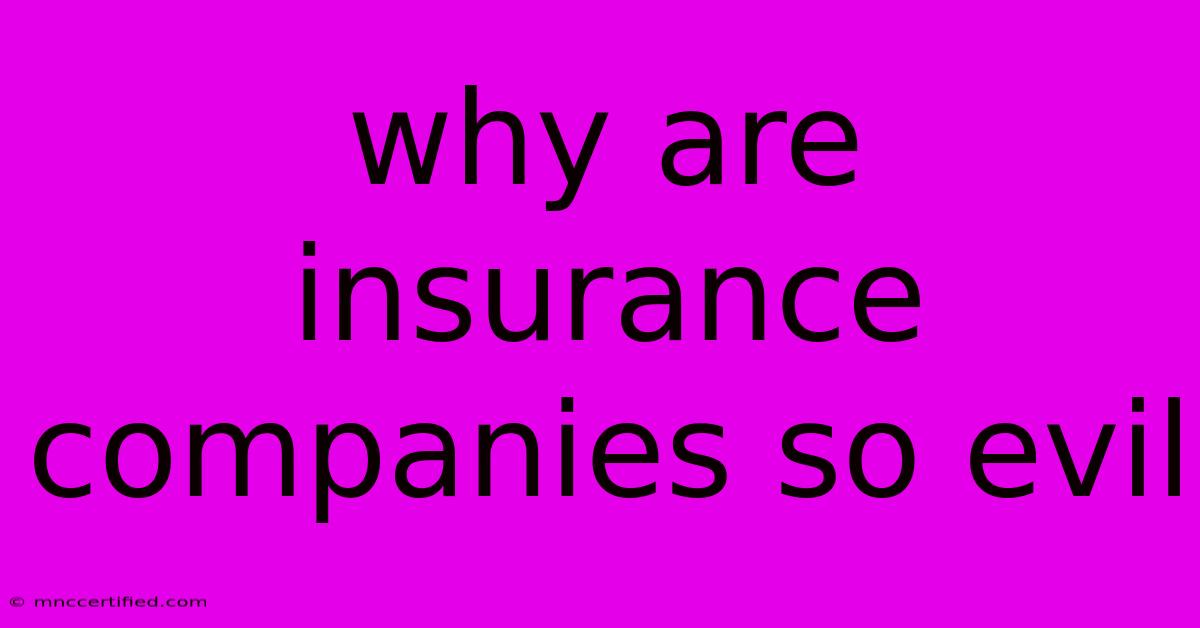Why Are Insurance Companies So Evil

Table of Contents
Why Are Insurance Companies So Evil? Debunking the Myths and Understanding the Industry
The insurance industry often receives a bad rap, with accusations of being "evil" and prioritizing profits over people. While it's true that insurance companies are businesses and aim to make money, painting them as inherently malicious is a mischaracterization. This article delves into the complexities of the insurance industry, debunking common myths and exploring the nuanced reasons behind its often-negative public perception.
The Role of Insurance: A Necessary Evil?
Insurance exists to manage risk. Individuals and businesses pay premiums to transfer the risk of potential financial loss to an insurance company. In the event of a covered event, like a car accident or a house fire, the insurance company provides financial compensation. While this system sounds simple, it's rife with inherent complexities that can lead to misunderstandings and frustration.
Here's a breakdown of why the industry sometimes faces criticism:
- Profit-Driven Business: Insurance companies are businesses that need to generate profits to stay afloat. This means they strive to minimize payouts while maximizing premiums. This can lead to accusations of "nickel-and-diming" customers, denying claims, or using complex legalese in contracts.
- Complex Policies: Insurance policies are often lengthy and riddled with fine print. This can make it challenging for customers to understand their coverage and potential exclusions.
- Claims Processes: Navigating the claims process can be a frustrating experience. The process might involve extensive paperwork, lengthy investigations, and potentially lengthy waiting periods for reimbursements.
- Perception of Denials: It's understandable that individuals feel frustrated when their claims are denied. However, insurance companies have the right to investigate claims and deny those they deem fraudulent or not covered by the policy.
- Marketing Tactics: Insurance companies often use aggressive marketing tactics, targeting vulnerable individuals with fear-mongering campaigns. This can lead to the perception of a company that profits from people's anxieties.
Understanding the Other Side: Why Insurance Is Essential
While the insurance industry faces valid criticisms, it's crucial to recognize its essential role in society.
- Financial Security: Insurance provides peace of mind, protecting individuals and businesses from potentially devastating financial losses. This is particularly important for unexpected events like natural disasters, medical emergencies, or legal liabilities.
- Risk Mitigation: Insurance encourages preventative measures by offering lower premiums to individuals and businesses who take steps to minimize risk. This can lead to safer workplaces, healthier lifestyles, and a more secure society.
- Economic Stability: Insurance plays a vital role in the economy by providing financial support during times of crisis. This can prevent widespread economic collapse and help individuals and businesses recover from unexpected setbacks.
Moving Forward: How to Navigate the Insurance Landscape
Instead of viewing insurance companies as inherently "evil," it's important to adopt a more informed and nuanced perspective.
Here's how you can navigate the insurance landscape:
- Read Your Policy Carefully: Take the time to thoroughly understand your insurance policy, including its coverage, exclusions, and limitations. Don't hesitate to ask questions and seek clarification from your insurer.
- Compare Quotes: Don't settle for the first insurance quote you receive. Shop around and compare quotes from different companies to find the best value for your needs.
- Understand Your Rights: Familiarize yourself with your rights as an insured individual. Know how to file a claim, what to do if your claim is denied, and where to seek assistance if you need it.
- Advocate for Change: Support organizations that advocate for consumer rights in the insurance industry. Engage in conversations about industry practices and demand transparency and fairness.
Conclusion: A More Balanced Perspective
The insurance industry is a complex system with both positive and negative aspects. While its profit-driven nature and sometimes-unfair practices deserve scrutiny, it's crucial to recognize its vital role in safeguarding individuals and businesses from risk. By being informed consumers, demanding transparency, and advocating for change, we can work towards a fairer and more equitable insurance system.

Thank you for visiting our website wich cover about Why Are Insurance Companies So Evil. We hope the information provided has been useful to you. Feel free to contact us if you have any questions or need further assistance. See you next time and dont miss to bookmark.
Featured Posts
-
Gavin Casalegno Summer I Turned Pretty Star Marries
Nov 13, 2024
-
Agreement To Provide Insurance Form
Nov 13, 2024
-
Noem Nominated For Homeland Security By Trump
Nov 13, 2024
-
Frank Auerbach Leading Painter Dies At 90
Nov 13, 2024
-
Personal Liability Travel Insurance
Nov 13, 2024